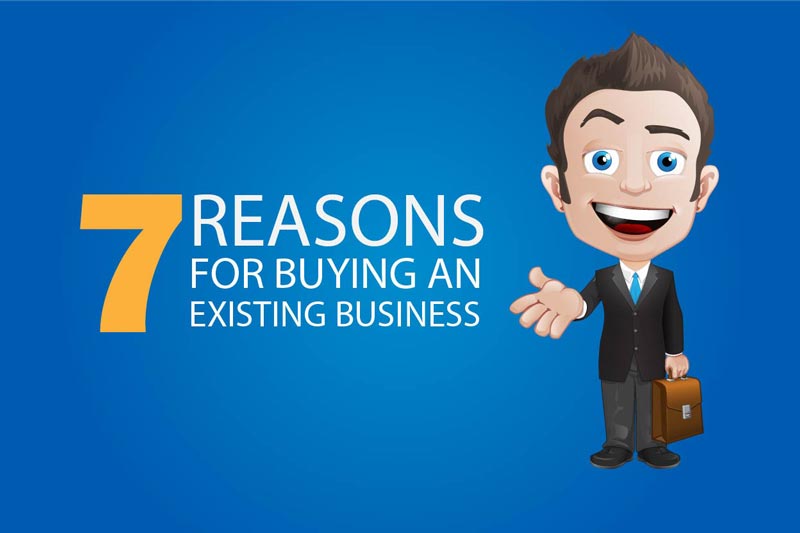7 Reasons Why You Should Buy An Existing Business,
Rather Than Start Your Own

As an aspiring entrepreneur, you may have asked yourself the question: “Should I buy a business or start my own?”
It’s a great question. But is there a right or wrong answer?
In reality, there are pros and cons on both sides.
You may have a business idea that you’re passionate about. You may have an idea that could potentially disrupt an industry or delier a new innovation to market.
Perhaps you simply want to handle every aspect of your business your way, rather than leading a team that already has an in-built culture and dynamic.
If that’s you, then starting your own business is probably the way to go.
If you’ve read the book ‘The E-Myth’ by Michael Gerber, you’ll know that 40 percent of new businesses fail in the first year. And that a staggering 80 percent fail within five years.
And here’s something else to consider…
One side of the fence isn’t any less entrepreneurial than the other.
Yes, there are many start-up success stories that demonstrate the disruption and innovation that is often associated with entrepreneurialism. Uber and Airbnb are just two names that tick this particular box. But Howard Schultz and Ray Kroc – super successful businessmen in their own right, didn’t build their Starbucks and McDonalds empires from scratch – preferring to acquire and grow already established businesses.
But all things considered, here at Entrepreneurs Gateway, we lean more heavily towards buying an already established business. And we’re going to give you seven solid reasons why we feel that way.
Let’s get straight into reason number one…
1
Finance

Unless you’re fortunate enough to have the next unicorn (such as an Uber) ready for launch, it’s far easier to obtain finance for the purchase of an existing business. Even if you yourself don’t necessarily have previous M&A experience.
That said – notice we said “easier” and not “easy”. If you’re looking for your first acquisition, you should be prepared to jump through a few hoops and prove to whoever you’re approaching for funding that you’re worthy of their investment.
But lenders are far more likely to provide funding for an established company with a track record and a trading history. There is a proven concept, processes, systems and customers already in place. All of this supports your case for investment.
However, a start-up – even with a solid business plan and projected financials, is deemed much more of a risk. There is no track record, no trading history and no customers in place.
It’s not impossible, of course, but it is far more challenging.
Which leads us nicely onto number two…
2
Brand

When you acquire an existing business, you’re also acquiring a brand. And in many ways, this can add value to the business that isn’t already sitting on the balance sheet.
A recognisable brand not only provides confidence, reassurance and a track record, it may also include copyright and trademarks. Additionally, you may also enjoy the benefits of an established website that’s already generating leads and enquiries.
Assuming the previous owner operated the business in the right way, you have a reputation in the marketplace and in the community. This will likely mean you’ll receive leads by recommendation and word of mouth.
Also, when it comes to attracting new customers through sales and marketing activities, you’ll potentially have hundreds or thousands of testimonials to back up your story.
3
Staff

When you make an acquisition, you’ll also have the benefit of inheriting a fully-trained and experienced workforce. This is one of the most valuable and important assets a business has.
Think about it… it takes time, money and effort to find, recruit and train employees. Then there’s the often-overlooked aspects of staff development and assimilating them into the company’s culture.
Having an existing team in place – particularly one that already engrained in the ways of the company – comes with other advantages too.
It makes developing and implementing growth strategies far easier. Plus, it also allows you to work on the business rather than in the business, freeing up more of your time. This enables you to focus on the areas where you can add value, as well as go after more acquisitions.
You will also have the opportunity to take a vacation or spend more time with family. Whereas when you’re a start-up owner, you often don’t have this luxury.
4
Contacts

When you take over a running business, you’ll also have a number of suppliers, solutions providers, contractors and other contacts on your books.
Over time, you may decide to switch to those that you prefer to work with. However, it does save you time and money in the beginning, when your time is going to be short whilst you familiarise yourself with all aspects of the operation.
But here’s the real kicker:
Do not… and I repeat do not underestimate the value of having already established suppliers and credit terms. You won’t be paying pro-forma, as you’ll have existing arrangements for 21-day, 30-day, 60-day or more, when it comes to payment terms.
This alone can profoundly and positively affect your cashflow. Engineering appropriate payments terms – both for money coming in and cash going out – is something that should not be underestimated.
And with a solid supply chain already in place, you’re able to avoid the kinds of operational disruptions that can hinder and damage customer relationships. It also saves considerable time and effort in establishing these relationships from scratch.
5
Customers

The lifeblood of a business is it’s cashflow… and what do you need to produce cashflow? Paying customers.
Winning new customers is hard enough when you have an existing business – and so imagine how much more difficult it is for a start-up. And so, having access to new customers via an acquisition is like hitting the ground running.
But, a word of caution…
Always be mindful of how much of the relationship between customer and company relies on the outgoing business owner.
This is often more prominent in smaller companies – ones where the owner plays a very active role in customer acquisition, relations or account management. Therefore, you need to be sure that when the previous owner has gone, that many of the company’s customers don not follow suit.
If they don’t, then you may have a potential goldmine at your fingertips. Often, a business owner who’s selling may have grown tired of the business and won’t have utilised its customer base to the maximum.
This gives you the opportunity to consider what additional products and services you could sell to these clients.
6
Focus

When you acquire a business, as opposed to launching one, you can immediately focus on areas that you feel require your attention. This may be improving and growing the business, hiring new staff, laying existing staff off, or increasing prices.
Whichever it is, you won’t have the feeling of overwhelm that so many start up owners experience. The seller of the business has already gone through this – laying the foundations, taking care of time-consuming and tasks – and all the stress that goes with it.
You, on the other hand, can be looking to the medium and long term. What needs to be implemented in order to keep growing the business? Are there other strategic acquisitions you’d like to make in the same sector?
Additionally, when you starting a new business, there’s often significant initial investment required for items such as offices, furniture, computers, etc. Without that burden hanging over you, you can look to where investment may be required to achieve your growth strategies.
7
Income

As you would expect, having instant cashflow from day one has massive advantages.
After you’ve purchased a successful business, you have the peace of mind to immediately rely on a predictable revenue. This ensures that operations, payroll and debt service are all paid for. It also means you have an instant salary.
In the start-up world, it’s not uncommon to have to wait months or years before there’s enough cashflow to cover these costs. And how many start-up founders actually pay themselves what they’re truly worth?
A recent survey revealed that it can take a new business more than three years to become profitable. But by acquiring an already profitable business that’s generating a healthy cash flow, you won’t suffer from financial uncertainty. It also allows you to start paying off any finance used to fund your purchase of the business.
Tell us what you think!
Have we sold you on the concept of buying your own business, rather than investing many hours of blood, sweat and possible tears, in launching your own business?
Would you prefer to walk into an established business that’s already delivering products and services, has employees on the clock, and hungry customers waiting to buy? Or are you still keen to create the next Instagram or WhatsApp?
Let us know in the comments below.


